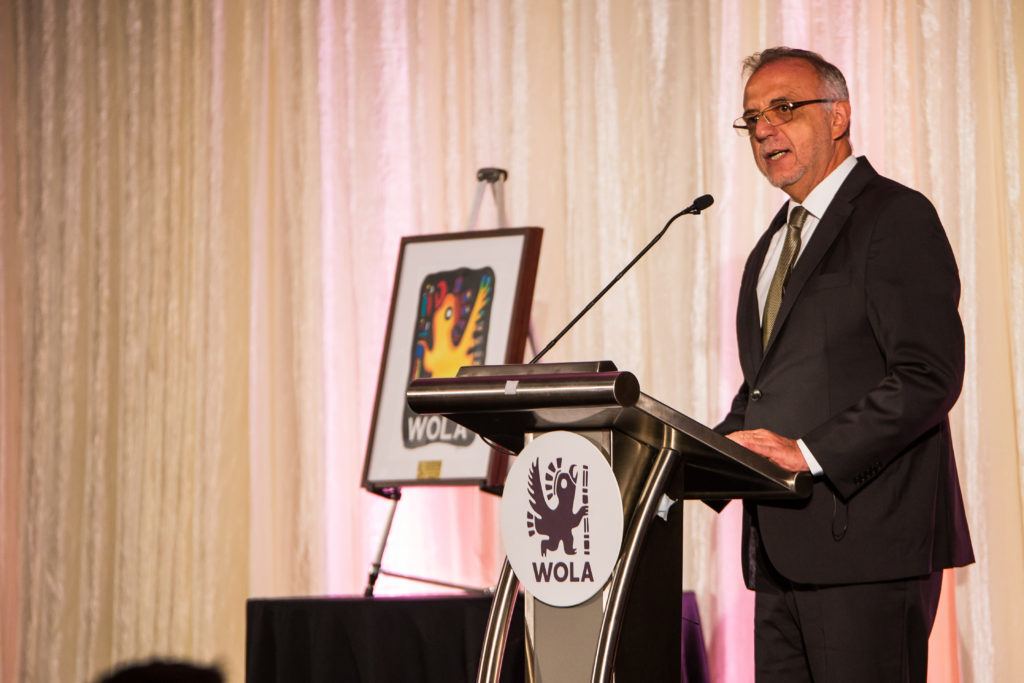(AP Photo/Moises Castillo)
(AP Photo/Moises Castillo)
This article is part of WOLA’s series looking at some of the most significant human rights trends and events of the 2010s.
See the full series here.
Combating corruption is essential to protecting human rights. Across Latin America, weak rule of law and poor governance has led to citizen insecurity, the decline in public services like health and education, a less prosperous economy, and the bolstering of criminal groups, to name just several of the negative impacts. Moving into a new decade, the failure of elected officials to recognize widespread discontent with endemic corruption could yet fuel more outpourings of public outrage—or, in another scenario, it could cause voters to sink into apathy as institutions across the region fall deeper into the grip of unscrupulous, anti-democratic forces.
Since 2007, Guatemala emerged as a regional leader in anti-corruption efforts, as its Public Prosecutor’s Office worked in conjunction with the UN-backed initiative the International Commission Against Impunity in Guatemala (CICIG) to investigate the infiltration of criminal networks in state institutions. Many of these probes implicated the country’s most powerful political and economic elites, including President Otto Pérez Molina and Vice President Roxana Baldetti, both of whom were forced to resign after revelations of their misconduct sparked nationwide protests in 2015. In addition to building the capacity of Guatemalan prosecutors and police, and earning high levels of approval from the Guatemalan public, the CICIG helped pass dozens of reforms that empowered investigators to more effectively combat organized crime and graft.
However, once the Public Prosecutor’s Office and the CICIG began investigating the sensitive topic of campaign finance malfeasance, attempts by political and economic elites to neuter the commission intensified. The Trump administration’s withdrawal of consistent U.S. support for anti-corruption crusaders further emboldened the country’s so-called “pact of the corrupt.” President Jimmy Morales defied his country’s Constitutional Court and unilaterally terminated the CICIG’s mandate, resulting in the commission’s withdrawal from Guatemala in September 2019. Nonetheless, the CICIG left behind a strong track record of success and an important model for other anti-corruption efforts in the region. It is a legacy that elites in Guatemala are now attempting to dismantle, via attacks against former CICIG employees, a lack of support for the special anti-corruption prosecutorial unit that once worked hand-in-hand with CICIG, and a regressive legislative agenda in the Guatemalan Congress
In 2016, with backing from the Organization of American States (OAS), Honduras established its own anti-corruption initiative, known by its Spanish acronym MACCIH, in response to a massive corruption scandal within the national social security system, which provides medical care and pensions. While the MACCIH has made important progress in bolstering the investigative capacity of Honduran institutions and helping to advance emblematic corruption cases, it has also encountered significant obstacles and opposition, and its future prospects in Honduras remain in doubt.
In Mexico, rampant corruption has long played a major role in contributing to ongoing violence and insecurity. Weak institutions, collusion between state forces and organized crime, and a culture of impunity helped fuel record levels of homicides over the past decade. However, the need for intensive anti-corruption efforts became more central to the national conversation after several conflict-of-interest scandals rocked President Enrique Peña Nieto’s administration. Under mounting pressure, Peña Nieto signed a sweeping anti-corruption reform package into law in July 2016, creating the National Anti-Corruption System. While President Andres Manuel López Obrador made combating corruption a centerpiece of his winning campaign platform in 2018, his administration hasn’t yet granted the country’s anti-corruption system the resources it needs to be successful.

Iván Velásquez Gómez, Commissioner, International Commission Against Impunity in Guatemala (CICIG), an honoree at the 2018 WOLA Human Rights Award for his courageous leadership as head of the CICIG, a unique UN-backed agency working with Guatemalans to investigate and dismantle entrenched criminal networks.